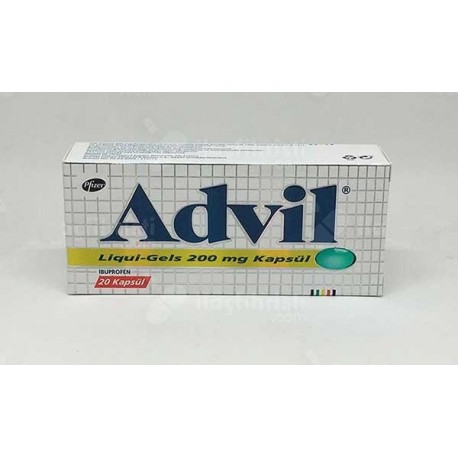 View larger
View larger Advil (Liquigel) 200 Mg 20 Capsules
ADV6654
New product
BUY MORE PAY LESS
| Quantity | Discount | |
|---|---|---|
| 2 | 5% | |
| 3 | 10% | |
| 4 | 15% | |
| 5 | 20% |
Volume discounts
| Quantity | Discount | You Save |
|---|---|---|
| 2 | 5% | Up to $2.90 |
| 3 | 10% | Up to $8.70 |
| 4 | 15% | Up to $17.40 |
| 5 | 20% | Up to $29.00 |
More info
ADVIL LIQUI-GELS 200 mg capsules
It is taken orally.
Active ingredient
Each capsule contains 200 mg of ibuprofen.
Excipients
Macrogol 600, 50% potassium hydroxide solution, sorbitol liquid, gelatin, purified water, quinoline Yellow (E104), patent blue V (E131), Opacode S-1-7020 (when using the markem technique for printing): Opacode NSP-78 -18022(stripe technique for printing
1. What is ADVIL LIQUIGEL and what is it used for?
ADVIL LIQUI-GELS 200 mg Capsules are oval, green, liquid-filled capsules with the white “Advil” logo on them. Each box contains 10, 20 or 40 capsules.
ADVIL LIQUI-GELS belongs to a group of drugs known as Non-Steroidal Anti-Inflammatory Drugs (NSAIDs-non-steroidal anti-inflammatory drugs).
ADVIL LIQUI-GELS is used to relieve rheumatic pains, backache, headache, toothache, muscle aches, menstrual pains, cold and flu symptoms and to reduce fever.
2. How to use ADVIL LIQUIGEL?
Instructions for proper use and dose/frequency of administration
Adults and children over 12:
Take 1 or 2 capsules every 4 to 6 hours as needed. Do not exceed 6 capsules (1200 mg) in 24 hours. If the pain increases or lasts more than 10 days, stop using the medicine and consult a doctor, unless otherwise directed by the doctor.
Application route and method
• ADVIL LIQUI-GELS is taken orally.
• Capsules should be taken with a glass of water.
• Different age groups:
Use in children
Use in the elderly
Use in the elderly
Use in the elderly
Special use cases
Kidney/liver failure: Consult your doctor before use if you have kidney or liver failure.
If you have the impression that the effect of ADVIL LIQUI-GELS is too strong or too weak, talk to your doctor or pharmacist.
If you use more ADVIL LIQUIGEL than you should
If you have used more than you should use from ADVIL LIQUI-GELS, talk to a doctor or pharmacist.
3. What are the possible side effects?
Like all medicines, there may be side effects in people who are sensitive to the substances contained in ADVIL LIQUIGEL.
If any of the following occur, stop using ADVIL LIQUI-GELS and IMMEDIATELY inform your doctor or go to the nearest hospital emergency department:
If;
• A serious disease with fluid-filled blisters on the skin, skin peeling and tissue loss (toxic epidermal necrolysis)
• Peptic ulceration (stomach ulcer) or perforation (perforation): severe abdominal pain, vomiting blood (or coffee grounds-like liquid), blood in the stool or tar-colored stool due to bleeding
• Meningitis: neck stiffness, headache, nausea, vomiting, fever or loss of orientation (perception of place, time, place)
• Aseptic meningitis (inflammation of the meninges)
• Itching
• Bullous dermatitis including Steven-Johnson syndrome
• Illness with blistering in the mouth and other areas of the body or with red rashes of different sizes (erythema multiforme)
• Serious allergic reactions (anaphylaxis): dizziness, fainting, palpitations, swelling of the face, throat and tongue
• Asthma and worsening of asthma, wheezing or difficulty breathing These side effects are very rare (less than 1 in 10,000 people).
Other side effects:
Other possible side effects are defined as shown in the following categories:
Uncommon: less than 1 in 100 patients Rare: less than 1 in 1000 patients.
Very rare: less than 1 in 10,000 patients
Unusual:
• Allergic reactions: hives, facial rash and itching
• Stomach ailments: abdominal pain, indigestion, burning and nausea
• Nervous system disorder: headache
Rare :
• Diarrhea, gas, constipation and vomiting
Very rare :
Decreased number of blood cells (eye and skin discoloration or yellowing, fever, sore throat, mild ulcers in the mouth, flu symptoms, weakness, bleeding or tenderness in the nose or skin
High blood pressure, heart failure, chest pain
Irritability, visual impairment, tinnitus and dizziness
Kidney disease (such as swelling in your ankles)
Serious skin reactions (swelling), blood sitting on the skin and around the eyes, inflammation with swelling and redness (Stevens-Johnson Syndrome), a serious disease with fluid-filled blisters on the skin (epidermal necrolysis)
Hypersensitivity (hypersensitivity), immediate hypersensitivity response (anaphylactic reaction)
Liver disease, liver inflammation (hepatitis) and jaundice.
Medications like ADVIL LIQUI-GELS have been associated with a small increased risk of heart attack and stroke.
If the above listed side effects become serious, stop using the medicine and contact your doctor or pharmacist immediately.

